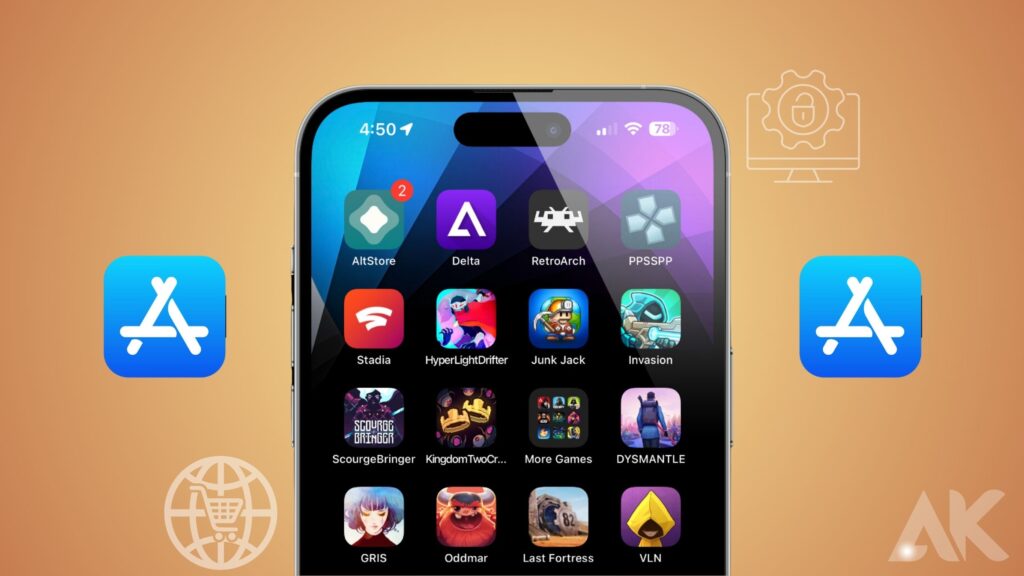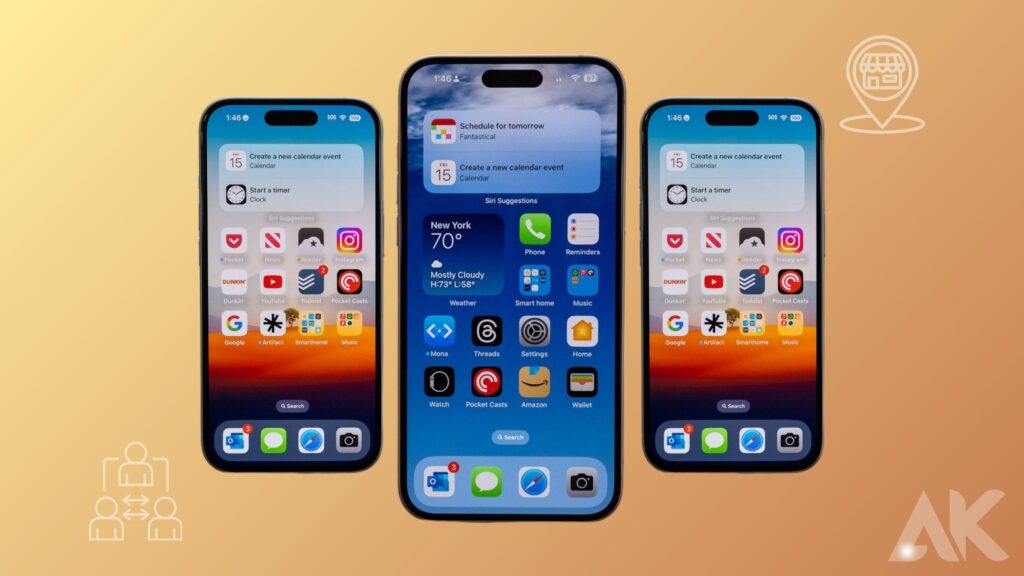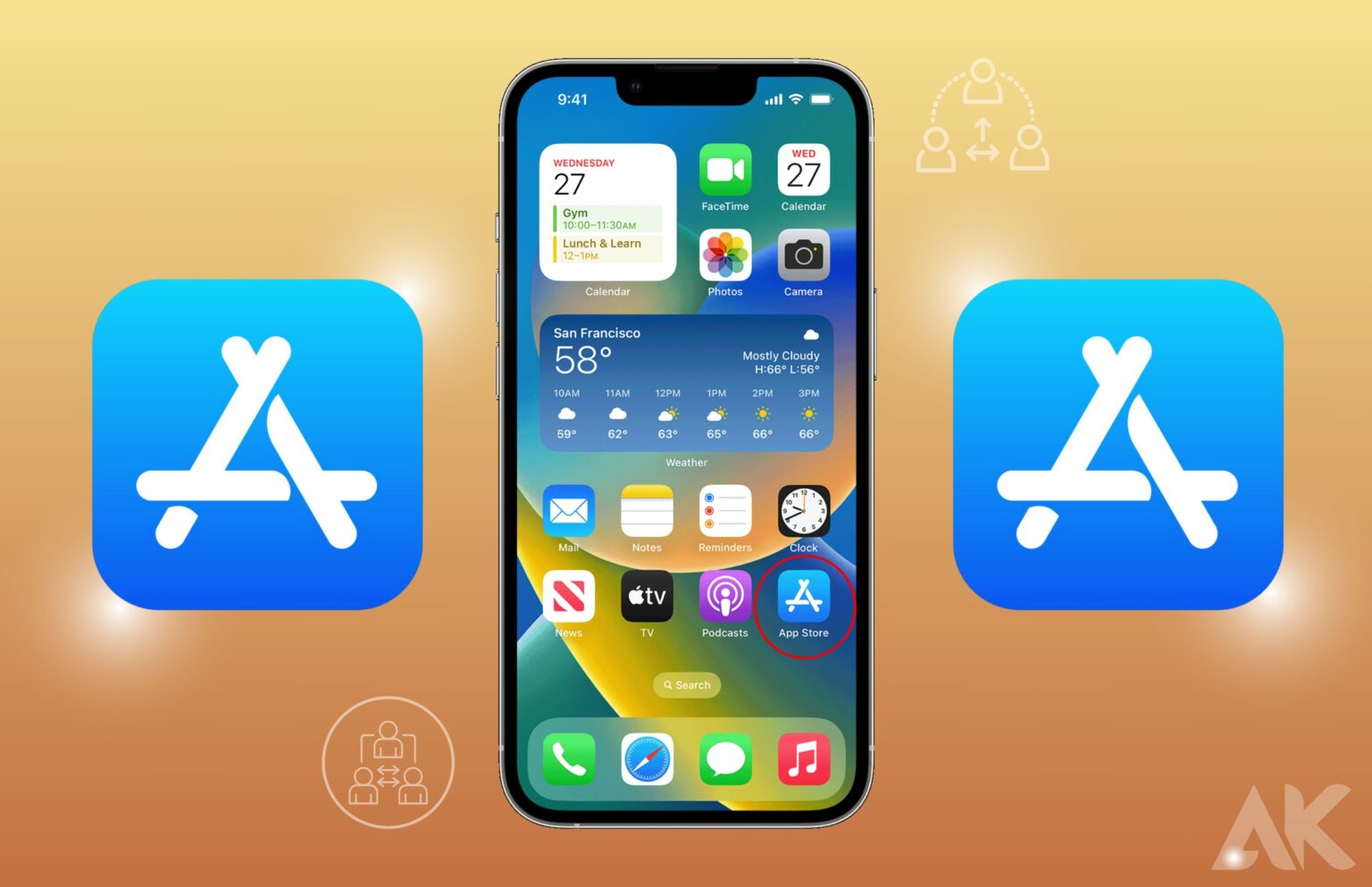Accessing apps on your iPhone is becoming more flexible as the digital world changes. Every iPhone user should read this article since it delves into the world of third-party app shops and explores how they work. If you take the time to learn about these details, you’ll be better able to choose apps with confidence.
Apple will soon allow third-party app shops and sideloading.

Support for third-party app stores and app sideloading will soon be available on iOS devices as Apple gets ready to ensure compliance with the Digital Markets Act of the European Union.
Apple executives have admitted their intention to comply with the Digital Markets Act (DMA) of the European Union, which mandates that Apple give control over the software on the iPhone and iPad. Even if the corporation resists government demands to make its gadgets accessible to third parties, other governments will most likely employ similar methods to impose their will.
This may sound revolutionary, but Apple has much history with the 2010 release of iOS 4 with the iPad and iPhone 4 to back up its support for third-party app stores and sideloading of specific apps. IT departments now have a framework to remotely secure and control iOS devices in the workplace and education, thanks to Apple’s mobile device management (MDM) for iOS devices.
The requirement to manage apps is an aspect of MDM platforms; Apple has developed and improved numerous methods for this purpose throughout the years. Allowing IT to automatically install apps during or after initial setup is one possibility. The second option is enterprise app stores, where workers may access and download company programs. These apps may include both publicly available ones like the App Store and more private ones like internal enterprise apps that aren’t available to the public.
The latter two could be used as models by businesses that want to launch their app stores. Because it is currently in existence, has been tested and improved over more than a decade, and permits the business to maintain control over iOS as a platform, Apple would probably employ this model.
Apple allows third-party app stores in Europe for the first time.

On Thursday, Apple unveiled massive changes to its approach to applications in Europe. These include a long-awaited move that will allow third-party app stores on iPhones and iPads, a reduction in Apple’s app store costs, and more.
In response to new rules in Europe that are expected to be implemented in March, Apple has made some of the most significant changes to its app business since the launch of its private app store fifteen years ago. This store is the foundation of its walled garden ecosystem. The adjustments are unprecedented and reflect this.
Customers may have additional options for how they can download and install apps as a result of the change. Additionally, developers may have more freedom in their user marketing strategies as a result of other revisions to Apple’s conditions.
These actions demonstrate that EU lawmakers were effective in getting Apple to alter its business strategies in response to developers’ accusations of monopolistic or anticompetitive activity.
Within the revisions, Apple announced that consumers will be able to download app stores from websites outside of its ecosystem onto their devices. With the ability to install other apps from those third-party markets, the app stores will function as independent apps on an iOS device, according to Apple.
It was also announced that Apple would offer to lower the fees it collects on digital products and services in-app purchases from 30% to 17% and, for developers who are eligible for certain discount programs through Apple, from 15% to 10%.
Currently, according to Apple, just 3% of developers in the EU pay the usual 30% commission, and 9% pay the discounted rate. According to the firm, the remaining 88% of developers do not pay.
It was announced that app developers will be able to offer payment options that are not dependent on Apple’s infrastructure. What’s more, Apple will not levy a commission for this feature. Additionally, it was emphasized that Apple will not get any fees from apps that are distributed through third-party app stores.
As a trade-off, developers will now pay half a euro for each app installation beyond the first one million in a year if they want to use the new features and pricing system. Apple estimated that the installation-based fee would apply to less than one percent of developers in the European Union. Apple has stated that its current terms and cost structure are available to developers who would like to keep using its proprietary technology.
App developers will get the opportunity to test out the changes as early as Thursday, and users in the European Union will have access to the enhanced functionality in March with Apple’s next upgrade to the iOS operating system, version 17.4.
Significant differences between Apple’s global and European strategies are evident in the company’s decision to modify its business practices to comply with the requirements of the European Union’s new Digital Markets Act (DMA). Apple stated last week that it will be accepting alternate payment methods in response to a US court decision. Apple’s decision to charge a commission of up to 27%, which is different from its European practices, infuriated some developers. They accused the corporation of engaging in “specious” compliance with the court ruling.
Critics of Apple, such as the Coalition for App Fairness—a group that included “Fortnite” developer Epic Games, Spotify, Tile, and others—decried Thursday’s announcement by the tech company as a stopgap move meant to make it look like they were compliant.
The executive director of the DMA, Rick VanMeter, stated that the strategy would not promote digital market fairness and competition since it is neither fair, reasonable, nor non-discriminatory. “Developers are faced with a choice in Apple’s proposal: continue with the current awful state of affairs or embrace a new set of complicated terms that are detrimental to both developers and consumers.”
On the other hand, Epic Games—which for years battled an antitrust war with Apple in the US and in 2020 had “Fortnite” removed from the App Store—announced on Thursday that the hit online game will be available again on iOS in Europe this year. Epic Games has announced in an X post that they will be launching an iOS app store to distribute the game.
The developers at Epic Games have promised to keep arguing with authorities and courts that Apple violates the law.
On Thursday, Apple remained mum on the question of whether or not the company plans to roll out the modifications it is implementing in response to EU regulation globally.
Additionally, they claimed that Apple’s modifications violate EU law by drastically altering its app ecosystem, which might put customers at higher risk of security issues in some instances. In addition, the business emphasized that third-party app stores will still be subject to certain security requirements and that basic automated and human security inspections will still be conducted on all apps.
Apps published by third-party app shops, the company stated, will not be subject to the same quality and content reviews as Apple’s app stores.
More mobile payment methods may become available to customers as a result of other improvements Apple is implementing in Europe. Developers will be able to access the tap-to-pay chip on iPhones with iOS 17.4, according to Apple. This opens the door for alternative iOS wallet apps that may be used for contactless payments at checkout and retail kiosks.
At the same time, when customers in the European Union launch Safari for the first time after installing iOS 17.4, Apple has announced that, as part of its browser updates, a new option screen will appear. On the choice screen, users will find a list of other browsers like Chrome and Firefox, and they will also get the option to change Safari’s default browser. There have been long-standing concerns that IT companies could manipulate default settings to promote their applications. This modification is an attempt to address such concerns.
Apple also announced that consumers in the European Union will have the option to change the default app store on their devices from Apple’s app store to a third-party marketplace, in addition to the ability to change browser defaults.
The app store as an enterprise app
Any time you’ve logged into your work iOS device, it was probably part of a management platform. An MDM client app is one of the first things a new employee in a bring-your-own-device (BYOD) environment should download from the App Store upon starting a new job. For Using that app, you enroll your device with an MDM server that lets your company configure different device settings, security states, and work-related accounts—commonly, this provides you with access to corporate Wi-Fi, sets up your email, and likely requires a complex password.
Additionally, this might open the door to an enterprise app store, which could be accessed through the MDM client app or as an independent choice. The design and operation of a business app store are often reminiscent of Apple’s App Store. You can tell it’s different because it doesn’t use your payment method or link it to your Apple ID.
Your company has already paid for the apps, and your identification is based on your workplace user account, which enables you to log into a Mac or PC or access services like Microsoft 365. From the standpoint of the user, a corporate app store isn’t all that noteworthy. Installing apps for work is all it takes.
If you weren’t using an enterprise app store, you might not be able to tell them apart. However, your iOS device is creating a sandbox to keep your personal and business apps separate. One practical benefit of this separation is that your employer will not be able to access or erase any personal information, like images or health records, stored on your device or in any personal applications you may have installed. Only apps (and the data they generate) installed through the company app store (which may expand to other commercial stores) will be accessible to your employer.
What about sideloading or non-app storefronts?
While it’s safe to assume that Apple would prefer that third-party shops operate similarly to enterprise app stores, this is by no means guaranteed. One potential solution would be for developers or independent shops to upload an app to a web server, and anyone could download it. It would function similarly to macOS.
In my opinion, Apple will not provide support for this until they are specifically compelled to. Since Apple’s WebKit rendering engine is still tightly integrated into all iOS browsers, the business could easily prohibit app downloads from third-party websites.
Installing programs over the web is still manageable, even on macOS. The Mac App Store is the only app store that a Mac will allow by default. App Store and identified developers (i.e., apps from developers whose code has been signed and approved by Apple) are an option in the Privacy & Security section of System Settings where this can be adjusted. While unsigned apps can still be installed, they will not be able to operate on a Mac unless the user follows certain instructions to enable the app to run regardless.
This means that without additional settings, it is highly unlikely that sideloading apps from non-defined app stores will be supported. Another option is for apps to be digitally signed in a way that grants them access to a restricted area of iOS. Testflight, Apple’s platform that lets developers sign up customers to be beta testers, is one example.
Sideloading vs. alternative app stores
Because they both refer to obtaining applications from sources other than Apple’s App Store, both words are commonly used interchangeably; however, there are significant differences between them. When you install software on your Mac or PC from a source other than an app store, you’re engaging in sideloading. This was the standard method of installing software before the advent of integrated mobile and app stores. Depending on your security settings, Apple still provides some level of support for the procedure on macOS.
Developers that invite customers to test and report on unreleased or beta apps, as well as businesses or schools, are among the few scenarios in which Apple enables sideloading on iOS.
A different app store is just that—a different app store. You can use it to shop, install apps, and browse the web. Users consistently follow a centralized source to do these tasks. Based on any criteria they like, they can approve or reject certain apps. They have the option to do reliability and security tests (as Apple does) or not. They have complete discretion over how they handle customer complaints, refund requests, and app virus detections. Pricing, developer remuneration, and legal obligations can all be managed with a degree of transparency that suits them.
Is Apple still gatekeeping?
The first thing I want to mention about an enterprise app store is that it is crucial. Accessing the corporate app store is as easy as downloading an app from Apple’s App Store. The enterprise app store is an app that Apple has reviewed and approved for its App Store, so there’s still one more step where Apple gets involved. Alternatives to Apple’s App Store will likely be required by the tech giant to mimic its functionality.
Since each store will have to adhere to specific criteria to be accessible to customers, this implies that Apple will be facilitating rival storefronts while still exercising some control. Even if Apple can’t control what sellers sell or how customers pay, it can make sure that other stores provide adequate security and responsibility.
As a result, Apple will have some control over the process, although a limited one. This is, to some extent, an absolute must-have. Users need a means to shop at competing stores, and the obvious choice is for other stores to launch their applications.
The likelihood of Apple sandboxing rival app shops and their products is high. There are just a few ways for apps to communicate with each other or with iOS, and apps are already confined to a fairly protected environment inside iOS.
Based on its MDM approach, which aims to create complete or near-complete separation, Apple is expected to expand upon this. Instead of keeping business and personal life apart, the corporation will likely establish distinct app shops, with Apple’s App Store for apps that pass Apple’s review process and other app stores for apps that do not.
This could restrict the functionality of programs downloaded from third-party stores on iOS devices. Apple is likely to prevent third-party apps from interacting with App Store apps or sensitive data kept on an iOS device, similar to how a working app cannot access a personal app in a corporate setting. Apple is likely to take sandboxing to the next level by further restricting the interoperability of apps from other stores.
This may become complicated if you’re installing apps from different sandboxed app shops. Each app’s origin and the apps it can share data with may be difficult to discern without a label on the icon.
So far, there is no clear indication as to which apps are for work and which are for personal use, even though Apple does this in theory. Apple has kept this feature to maintain the iOS user experience on a managed device because they want an iPhone to continue looking and feeling like an iPhone even when it is under the owner’s IT department’s control. There’s a chance that apps from different stores will get a badge or emblem of some form. This might come from Apple, the stores, or even the creators themselves.
Conclusion
Apple is preparing to comply with the EU’s Digital Markets Act, allowing third-party app markets and sideloading of individual apps on iPhones and iPads for the first time in company history. This move is in response to new European regulations set to take effect in March. Apple will allow users to download third-party app stores onto their devices from websites outside of Apple’s ecosystem and will offer to slash the fees it collects from in-app transactions involving digital goods and services.
The company will also offer alternative payment methods that do not rely on Apple’s systems and will not charge a commission for doing so. Developers who opt to take advantage of the new capabilities and fee structure will be charged a new fee of 0.50 euros for every installation of an app after the first 1 million installs in a year.
FAQS
What does a third-party application on iOS mean?
Apps developed by companies other than Apple’s or Google’s official app stores are known as third-party apps. These apps do not come pre-installed on your device.
What is the risk of third-party apps?
Malware is a major concern when it comes to programs that are developed by third parties. By taking advantage of the security holes in these apps, bad actors could compromise your company’s systems with malicious code. Data leaks, network outages, and monetary losses are all possible outcomes.

